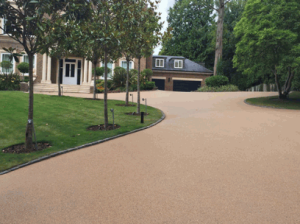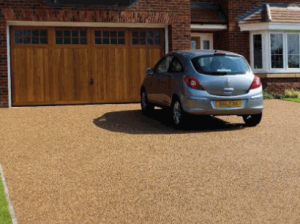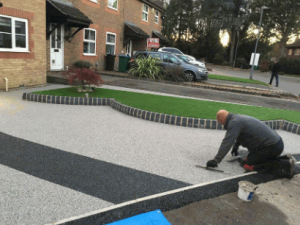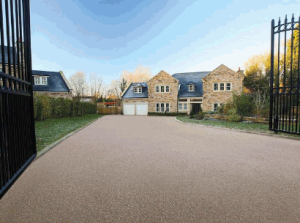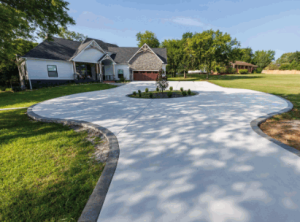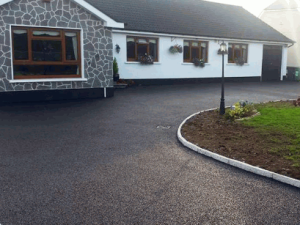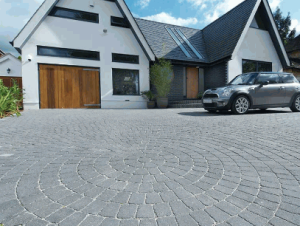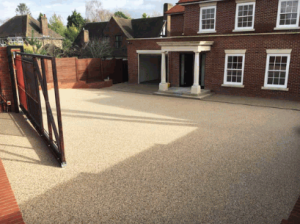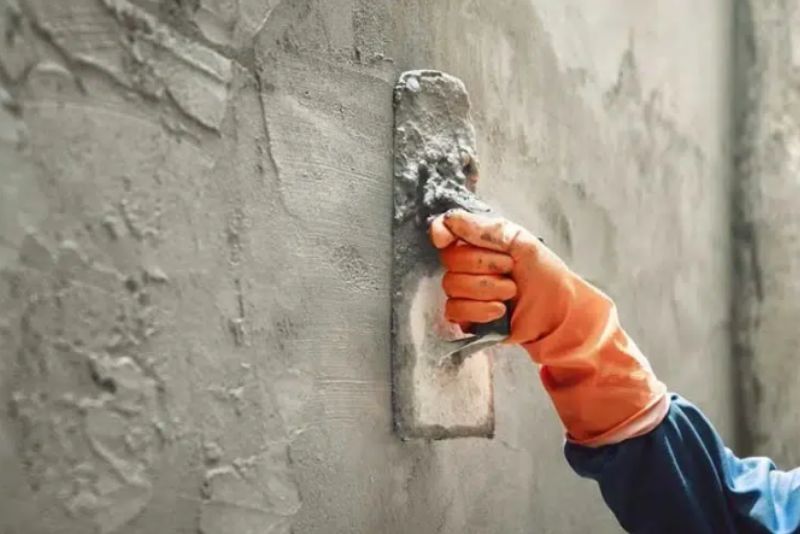Are Resin Bonded Driveways Expensive
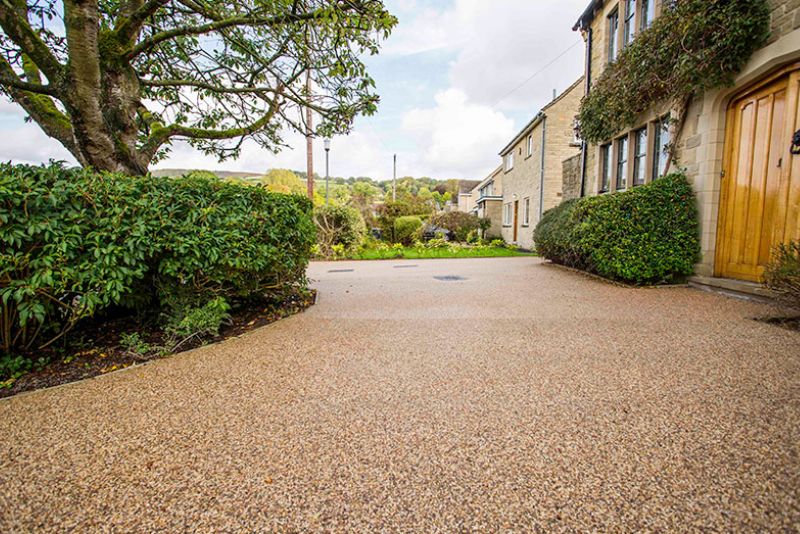
Resin bonded driveways have become a popular choice for homeowners looking to enhance the curb appeal of their property.
We will explore what resin bonded driveways are, how they are installed, and the benefits they offer such as being aesthetically pleasing, durable, and low maintenance.
We will also discuss the drawbacks of resin bonded driveways, compare them to other driveway materials, and answer the burning question – are resin bonded driveways expensive?
Find out how you can save money on resin bonded driveways!
What Are Resin Bonded Driveways?
Resin bonded driveways are surfaces where a layer of UV-stable resin is applied over pre-existing tarmac, concrete drive, or block paving, mixed with aggregate to create a durable and visually appealing finish.
This combination of resin and aggregate not only enhances the aesthetic appeal of the driveway surface but also provides a hard-wearing and low-maintenance solution.
The bonding process involves spreading the resin across the surface and then scattering the chosen aggregate over it. The UV-stable resin acts as a binder, securing the aggregates in place while allowing water to drain through, making the driveway surface permeable.
Take a look: Is Resin Driveways Cheaper Than Block Paving
How Are Resin Bonded Driveways Installed?
The installation of resin bonded driveways involves thorough preparation of the base, mixing the resin with chosen aggregate, and skilled labor applying the mixture evenly over the surface.
Before starting the installation process, it is crucial to ensure that the base is properly prepared. This includes clearing the area of any debris, or weeds, and ensuring a smooth, compacted surface.
Next, the resin mixing stage is vital. Resin surfaces require precise mixing of the resin and aggregate to achieve the desired strength and appearance. Follow the manufacturer’s instructions carefully to create a homogeneous mixture.
The labor involved in driveway installation plays a key role. Skilled workers need to evenly spread and compact the resin mixture onto the prepared surface, ensuring a smooth and durable finish.
What Are The Benefits Of Resin Bonded Driveways?
Resin bonded driveways offer numerous advantages including being visually pleasing, durable, low maintenance, and having a permeable surface that is SUDS compliant.
One of the key benefits of resin bonded driveways is their ability to enhance the aesthetic appeal of any property. The sleek, modern look they provide can instantly elevate the overall appearance of a home, creating a welcoming entrance.
In terms of durability, resin bonded driveways are known for their long-lasting nature, standing up well to varying weather conditions and heavy usage over time. This ensures that the driveway maintains its pristine condition for years to come, reducing the need for frequent repairs or replacements.
Another advantage of these driveways is their low maintenance requirements. Unlike traditional surfaces such as concrete or asphalt, resin bonded driveways are relatively easy to clean and maintain, saving homeowners both time and effort.
The eco-friendly features of resin bonded driveways make them a sustainable choice for environmentally-conscious individuals. Their SUDS compliance allows rainwater to permeate through the surface, reducing the risk of flooding and helping to replenish groundwater.
Aesthetically Pleasing
One of the key advantages of resin bonded driveways is their aesthetic appeal, providing a modern and attractive finish that enhances the overall look of the property.
Regarding resin bonded driveways, homeowners have a plethora of color options to choose from. Whether you prefer a classic black finish for a sleek and sophisticated look or a bold red to make a statement, the versatility of resin finishes allows for endless customization possibilities. The finish styles range from smooth and glossy to textured and more rustic, catering to various architectural designs and personal preferences. These driveways not only offer durability and functionality but also add a touch of elegance to any property.
Durable And Long-lasting
Resin bonded driveways are known for their durability and longevity, with the ability to withstand heavy traffic and harsh weather conditions without deteriorating.
One of the key factors contributing to the impressive driveway longevity of resin bonded driveways is their exceptional resistance to common issues such as cracking, fading, and erosion. The unique composition of resin binders combined with high-quality aggregates forms a solid surface that can endure the weight of vehicles and varying weather conditions with minimal wear and tear.
This surface resilience ensures that resin bonded driveways maintain their aesthetic appeal and structural integrity over time, requiring minimal maintenance compared to traditional driveway materials. Whether facing extreme temperatures, heavy rainfall, or prolonged sunlight exposure, these driveways continue to provide a durable and visually pleasing entrance to your property.
Low Maintenance
One of the benefits of resin bonded driveways is their low maintenance requirements, needing only occasional sweeping and jet washing to keep them looking fresh and clean.
Due to their durable and impermeable nature, resin bonded driveways are inherently resistant to stains and weed growth, making them particularly effortless to maintain. Driveway care can be further simplified by using mild detergent solutions or specialized cleaners for more stubborn stains. If there are minor damages like cracks or chips, they can generally be easily patched up with resin filler or repair kits, ensuring a smooth and seamless surface. Regular upkeep and occasional resealing every few years contribute to the maintenance efficiency of resin driveways, keeping them in top condition for years to come.
Permeable Surface
Resin bonded driveways offer a permeable surface that allows water to drain through, making them environmentally friendly and SUDS compliant.
Due to their porous nature, driveway permeability allows rainwater to penetrate through the surface, preventing runoff and reducing the risk of flooding. This eco-friendly surface design also aids in natural groundwater recharge by allowing rainwater to filter into the soil below, replenishing local water tables. Resin bonded driveways contribute positively to sustainable urban drainage systems (SUDS) by managing stormwater effectively, reducing the strain on traditional drainage systems, and contributing to overall environmental sustainability.
What Are The Drawbacks Of Resin Bonded Driveways?
While resin bonded driveways have numerous benefits, drawbacks include the initial cost, limited color options, and the potential for cracking over time.
When considering driveway expenses, the upfront investment for resin bonded driveways can be higher than other options due to the specialized materials and installation process required. The color choices for resin driveways are typically more limited compared to other materials like concrete or asphalt, which can restrict the aesthetic appeal for some homeowners.
One of the common issues with resin driveways is the tendency for surface issues such as cracking, especially in environments with extreme temperatures or heavy usage. These maintenance challenges may require ongoing repair and upkeep to maintain the driveway’s appearance and functionality.
Initial Cost
One of the main drawbacks of resin bonded driveways is their initial cost, which can be higher compared to other driveway materials due to the quality of materials and labor involved.
When considering driveway pricing for resin bonded surfaces, it’s important to factor in the installation expenses, material costs, and any additional fees that may arise. The installation of resin bonded driveways involves skilled labor to ensure a smooth and durable finish, contributing significantly to the overall cost.
The materials used in resin bonded driveways, such as high-quality resin and aggregates, come at a premium price, which further adds to the total cost of the project. It’s crucial to obtain price quotes from multiple suppliers to compare budget considerations and ensure that you are getting the best value for your investment.
Limited Color Options
Another drawback of resin bonded driveways is the limited color options available, which may restrict customization choices for homeowners looking for specific shades or patterns.
When homeowners opt for resin bonded driveways, they often find themselves constrained by the predetermined color range offered by manufacturers. This can be particularly frustrating for individuals who have a clear vision of their desired aesthetic for their driveway. Despite these limitations, there are ways to work around the color constraints to create visually appealing driveways.
- One approach is to explore alternative surface treatments that can enhance the overall look of the driveway.
- Staining techniques or incorporating decorative elements like colored aggregates can introduce variation and texture, adding depth to the design.
- By carefully selecting complementary colors and patterns, homeowners can still achieve a personalized look within the confines of the available color palette.
Potential For Cracking
Cracking is a potential issue with resin bonded driveways, especially in areas with heavy usage or fluctuating temperatures, which may require periodic maintenance to prevent further damage.
One of the primary challenges related to cracking in resin bonded driveways is the constant exposure to heavy vehicle traffic, which can stress the surface and lead to the development of cracks over time.
To prevent such issues, regular driveway maintenance practices like cleaning debris, resealing the surface, and addressing any minor cracks promptly can significantly extend the lifespan of the driveway.
Regarding repairing existing cracks, techniques such as filling them with a compatible resin mix or applying a patching compound can help restore the appearance and structural integrity of the surface.
The impact of weather conditions should not be underestimated, as extreme heat or cold can cause the resin to expand or contract, exacerbating existing cracks or creating new ones, making it essential to consider these factors for long-term durability.
How Do Resin Bonded Driveways Compare To Other Driveway Materials?
When comparing resin bonded driveways to other materials like concrete, asphalt, or block paving, factors such as durability, aesthetics, and maintenance requirements come into play.
One of the key advantages of resin bonded driveways is their ease of installation. Unlike traditional materials which often require heavy machinery and a lengthy curing process, resin driveways can often be laid on top of existing surfaces, reducing the need for extensive groundwork and lowering labor costs.
In terms of cost-effectiveness, resin bonded driveways can be a more affordable option when compared to premium block paving or stamped concrete. The initial outlay may be slightly higher than basic asphalt, but the long-term savings in maintenance and repair can offset this difference over time.
Resin Bonded Vs. Concrete
In the comparison between resin bonded driveways and concrete, resin offers a more visually appealing and flexible surface, while concrete is known for its strength and longevity.
Resin bonded driveways, due to their unique composition, typically provide a smooth and decorative finish that can enhance the overall aesthetics of a property. The resin material allows for a wide range of color choices, patterns, and even the option to embed decorative elements such as stones or glass.
On the other hand, concrete driveways are recognized for their durability and ability to withstand heavy loads over time. The driveway strength of concrete makes it a popular choice for high-traffic areas or properties where heavy vehicles are a common presence.
Resin Bonded Vs. Asphalt
Resin bonded driveways differ from asphalt in terms of visual appeal and installation cost, with resin providing a more customizable look but at a potentially higher price point.
One of the notable advantages of resin bonded driveways is their durability compared to traditional asphalt surfaces. Resin driveways are known for their resistance to cracking, staining, and fading, making them a long-lasting option that requires minimal maintenance over time. Although the initial cost may be higher, the longevity of a resin driveway can result in cost savings in the long run due to fewer repairs and replacements needed.
Resin Bonded Vs. Block Paving
Comparing resin bonded driveways with block paving reveals differences in maintenance requirements, design flexibility, and overall cost, depending on the homeowner’s priorities.
Resin bonded driveways are known for their low maintenance needs, requiring occasional sweeping and power washing to keep them looking pristine. On the other hand, block paving may require more frequent weeding and re-sanding to prevent shifting of the blocks over time.
Regarding design, resin bonded driveways offer a seamless and modern appearance, while block paving provides a classic and traditional look with various patterns and colors to choose from. Homeowners looking for a sleek, contemporary style may opt for resin bonded driveways, while those desiring a more classic aesthetic might prefer block paving.
In terms of long-term expenses, resin bonded driveways tend to have a higher initial cost but require less frequent maintenance, potentially saving money over time. Block paving, although cheaper upfront, may require more regular upkeep and repairs, impacting the overall cost in the long run.
Are Resin Bonded Driveways Expensive?
The cost of resin bonded driveways varies based on project size, installation area, and the type of aggregate selected, with quotes typically provided per square meter to estimate the total price.
When considering driveway expenses, it’s essential to factor in not only the cost of materials but also the labor charges for installation. The quality of the resin and aggregate used can significantly impact the overall pricing, as higher-grade materials may come at a premium cost. The complexity of the design and any additional features like edging or patterns can also influence the final quote.
The total budget assessments for a resin bonded driveway should also include any preparatory work needed, such as site clearance or base preparation, which can add to the upfront expenses.
Factors That Affect The Cost
Several factors influence the cost of resin bonded driveways, including the size of the project, the quality of materials used, and the labor required for installation.
Regarding driveway pricing, labor expenses play a significant role. Skilled labor is essential for a successful installation, and their expertise can impact the overall cost. Material upgrades can also affect the budget. Opting for premium materials can elevate the project cost, but may offer better durability and aesthetics in the long run.
The scope of the project is a crucial factor. Larger driveways naturally require more materials and labor, leading to higher costs. In contrast, a smaller driveway may involve less labor and material, thereby reducing the overall expenses. Before proceeding with the installation, conducting thorough installation assessments to assess these factors can help in making informed decisions regarding the budget and project plan.
Average Cost Of Resin Bonded Driveways
When looking at driveway costs, it’s essential to consider the various factors that can influence the final price. Factors such as the quality of materials used, the complexity of the design, and the contractor’s experience can all impact the overall price estimates provided. Regional variations in labor costs and material availability can also affect the total cost of the project.
Industry standards suggest that the cost for resin bonded driveways falls within a certain range, but customization options can lead to higher pricing. Some installers may offer package deals that include excavation, ground preparation, and finishing, while others may charge separately for each step of the process, contributing to the overall driveway cost.
Cost Comparison With Other Driveway Materials
When comparing the cost of resin bonded driveways with other materials like concrete or asphalt, homeowners should consider long-term maintenance expenses and the value of a durable, visually appealing surface.
Resin bonded driveways offer a cost-effective solution for those seeking both longevity and aesthetic value. While the upfront investment may be slightly higher compared to traditional materials, the lower maintenance and repair costs over the years can lead to significant savings in the long run. The durability of resin bonded surfaces means fewer repairs and replacements, translating into lower overall expenses for homeowners. The aesthetic appeal of resin driveways adds value to your property, enhancing its visual appeal and curb appeal.
How Can You Save Money On Resin Bonded Driveways?
Homeowners can save money on resin bonded driveways by comparing quotes from multiple contractors, considering different aggregate options, and exploring cost-effective installation techniques.
One effective way to negotiate costs for a resin bonded driveway project is to ask if the contractor can offer a discount for a larger area or a package deal that includes other services. Additionally, choosing locally sourced aggregates can help reduce transportation costs and support the community. Another budget-friendly approach is to DIY the installation if you have the necessary skills, equipment, and time. By being flexible with the project timeline, you may also be able to take advantage of off-peak pricing or seasonal discounts.

